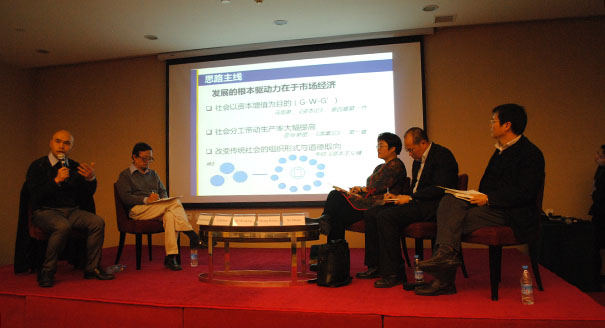Registration
You will receive an email confirming your registration.
As interactions between China and African countries grow, observers predict that such engagements could revitalize Africa and promote much-needed economic development. China has made significant investments in infrastructure, education, and technology in return for natural resources and market access. Some experts, however, question if these arrangements are as beneficial for the African governments and societies involved as they have been for Beijing.
Tang Xiaoyang presented an analysis from his latest book on China’s economic operations in Africa. In it, he characterizes China-Africa economic exchanges not as bilateral in nature, but as many contextualized series of encounters situated in an expanding global market economy. Shi Zhiqin then moderated a discussion with Li Anshan, He Wenping, and Zhang Haisen.
Discussion Highlights
- Comprehensive Market-Driven Development: Panelists asserted that China can aid in promoting sustained prosperity in African countries by helping to cultivate and refine the driving force behind it: their market economies. Yet African development, panelists also maintained, is not just about short-term GDP growth, but instead about fostering comprehensive markets that will ensure continual long-term growth. Sustainable development, they observed, will require harnessing market forces and Africa’s wealth of natural resources to forge supply chains that produce goods of lasting value.
- Greater Choice in Policy Paths: Certain Chinese development strategies and methods, panelists asserted, could be applied successfully in Africa if carefully implemented. They pointed to the example of China’s Special Economic Zones as a model for Africa’s nascent Economic Cooperation Zones. But panelists also conceded that African development paths differ from China’s own in important respects, especially governing capacity and size of labor force. These differences, they said, should guide policymakers’ decisions on which practices to replicate in Africa. Panelists concluded that the greatest asset China offers African countries is alternative development ideas to expand policy choices beyond existing U.S. and European models.
- Prosperity Through Economic Diversification: China has an established interest in African infrastructure and mining, yet panelists emphasized that emerging potential in manufacturing and agriculture also exists. The latter industries, they said, are an integral part of ensuring sustainable development and forging long-lasting supply chains. Many countries leverage their natural resources to spur growth, which requires extraction and transportation infrastructure. The latter, panelists observed, is itself a latent commodity in developing market economies. They pointed to the burgeoning cement, textile, and food product manufacturing in Nigeria as examples of how economic diversification is prompting a shift from natural resources to promising new avenues for economic growth.
- Societal Development Costs: Panelists maintained that while economics must be a primary focus of developing countries, lasting growth cannot be pursued without considering societal effects. For Africa's budding industries to compete globally, panelists agreed that African countries must cultivate and support a well-trained professional labor force. Achieving this goal requires not only an ongoing commitment to education, management, and labor relations, but also a dynamic balance between development and environmental protection as well as continual improvements in governance. Panelists concluded that Chinese companies remain invested in helping African countries both pursue further market development and also address these policy challenges.
- Concerns of Neocolonialism: Panelists observed that vast imports of natural resources from African countries to China invariably prompt concerns that the Chinese presence in Africa could be perceived as a form of neocolonialism. Panelists conceded that China-Africa relations do indeed have an overwhelmingly economic focus. Yet, they added, as a fellow developing country, China engages with Africa to facilitate growth and enhance the livelihood of people on both sides of these exchanges. Chinese commercial activities and development investments in Africa, panelists maintained, are vital to the continent’s economic future.
Tang Xiaoyang
Tang Xiaoyang is a resident scholar at the Carnegie–Tsinghua Center for Global Policy and an assistant professor in the Department of International Relations at Tsinghua University. His research interests include political philosophy, China’s modernization process, and China’s engagement in Africa. At the Carnegie–Tsinghua Center, Tang’s research focuses on China-Africa relations, with a particular emphasis on the dynamics of Beijing’s interactions with African member states of the Organization for Economic Cooperation and Development.
Shi Zhiqin
Shi Zhiqin is a resident scholar at the Carnegie–Tsinghua Center for Global Policy, where he runs the China-EU Relations program and the China-NATO dialogue series. Shi is also a professor and chancellor of the School of Social Sciences and dean of the Department of International Relations at Tsinghua University.
Li Anshan
Li Anshan is a professor in the School of International Relations at Peking University, where he is also director of the Center of African Studies. Li has been published in top international academic journals, such as the Journal of Contemporary African Studies (Cambridge University) and the International Journal of African History Studies (Boston University). His major works include A History of Chinese Overseas in Africa and British Rule and Rural Protest in Southern Ghana, the latter of which he collaborated on with Peter Lang.
He Wenping
He Wenping is director of the Africa program for the Institute of West Asian and African Studies at the China Academy of Social Sciences. She also serves as secretary of the China Middle East Society and is a member of the China Council for African Research. Her academic interests involve African development and politics, particularly African foreign policy, human rights, and democracy.
Zhang Haisen
Zhang Haisen is director of the Center for International Agricultural Cooperation and Development at the University of International Business and Economics. His research interests include development aid, China-Africa food security, and international agricultural trade. Zhang is a senior consultant at the China Development Bank and the International Agricultural Cooperation Committee of China’s Ministry of Agriculture. He is also an executive member of the Council of Chinese Foreign Agricultural Economic Research and a senior expert at the China Africa Research Institute.
